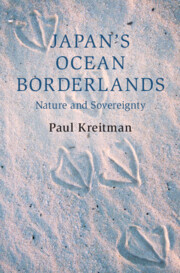
-
Select format
-
- Publisher:
- Cambridge University Press
- Publication date:
- 06 July 2023
- 27 July 2023
- ISBN:
- 9781108779241
- 9781108489706
- 9781108747462
- Dimensions:
- (229 x 152 mm)
- Weight & Pages:
- 0.58kg, 290 Pages
- Dimensions:
- (229 x 152 mm)
- Weight & Pages:
- 0.423kg, 288 Pages
You may already have access via personal or institutional login
Book description
Desert islands are the focus of intense geopolitical tensions in East Asia today, but they are also sites of nature conservation. In this global environmental history, Paul Kreitman shows how the politics of conservation have entangled with the politics of sovereignty since the emergence of the modern Japanese state in the mid-nineteenth century. Using case studies ranging from Hawai'i to the Bonin Islands to the Senkaku (Ch: Diaoyu) Isles to the South China Sea, he explores how bird islands on the distant margins of the Japanese archipelago and beyond transformed from sites of resource extraction to outposts of empire and from wartime battlegrounds to nature reserves. This study examines how interactions between birds, bird products, bureaucrats, speculators, sailors, soldiers, scientists and conservationists shaped ongoing claims to sovereignty over oceanic spaces. It considers what the history of desert islands shows us about imperial and post-imperial power, the web of political, economic and ecological connections between islands and oceans, and about the relationship between sovereignty, territory and environment in the modern world.
Reviews
‘Working in the eye-opening field of ‘political ecology,’ Kreitman shows how exploiting nature and conserving it both serve to ‘perform’ sovereignty.’
Andrew J. Nathan Source: Foreign Affairs
‘An entertaining and enlightening book.’
Bill Hayton Source: Asian Affairs
‘After reading this book, the reader can grasp the fluidity that surrounds these territories, invisible at a bird’s-eye view. Their sovereignty, resources, and even geography and natural features have changed over time, influenced by both the oceanic environment and human activity.’
Beatriz Martinez-Rius Source: H-Net
‘The book’s overall significance lies in its exploration of the role of the environment in geopolitical and imperial history, particularly in the context of Japan’s oceanic territories. It provides a unique perspective on how ecological considerations can influence territorial claims, and the interplay between environmental conservation and national sovereignty.’
Niki J. P. Alsford Source: International Journal of Maritime History
‘Scholars of Japanese history will find Kreitman’s arguments about the importance of bird islands and Japan’s Pacific borderlands to Japanese imperial politics and identity to be engaging and perhaps surprising … Anyone working in maritime history will appreciate Kreitman’s contributions to exploring the biopolitics of extraction, empire, and conservation … Finally, Kreitman’s prose is engaging, and he explains his important ideas clearly. His writing style is accessible enough to attract the attention of anyone in the reading public interested in histories of nature, maritime exploitation, the Pacific, or Japanese empire. The book is a valuable addition to the scholarship on colonial Asia as well as oceanic history.’
David J. McCaskey Source: H-Net Reviews
‘An important read for scholars of Pacific history, environmental history, and Empire studies.’
Nathan Samayo Source: Journal of Pacific History
‘Paul Kreitman has given us a granular understanding of modern Japan’s island engagements across a vast stretch of oceanic space. One looks forward to what he will illuminate next.’
Kären Wigen Source: Journal of Japanese Studies
‘… extensively researched and engaging …’
David R. Ambaras Source: American Historical Review
Contents
Metrics
Altmetric attention score
Full text views
Full text views help Loading metrics...
Loading metrics...
* Views captured on Cambridge Core between #date#. This data will be updated every 24 hours.
Usage data cannot currently be displayed.
Accessibility standard: Unknown
Why this information is here
This section outlines the accessibility features of this content - including support for screen readers, full keyboard navigation and high-contrast display options. This may not be relevant for you.
Accessibility Information
Accessibility compliance for the PDF of this book is currently unknown and may be updated in the future.


